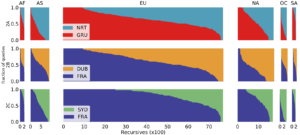John Heidemann gave the talk “Digging in to Ground Truth in Network Measurements” at the TMA PhD School 2017 in Dublin, Ireland on June 19, 2017. Slides are available at https://www.isi.edu/~johnh/PAPERS/Heidemann17c.pdf.
![]() From the abstract:
From the abstract:
New network measurements are great–you can learn about the whole world! But new network measurements are horrible–are you sure you learn about the world, and not about bugs in your code or approach? New scientific approaches must be tested and ultimately calibrated against ground truth. Yet ground truth about the Internet can be quite difficult—often network operators themselves do not know all the details of their network. This talk will explore the role of ground truth in network measurement: getting it when you can, alternatives when it’s imperfect, and what we learn when none is available.
This talk builds on research over the last decade with many people, and the slides include some discussion from the TMA PhD school audience.
Travel to the TMA PhD school was supported by ACM, ISI, and the DHS Retro-Future Bridge and Outages project.
Update 2017-07-05: The TMA folks have posted video of this “Ground Truth” talk to YouTube if you want to relive the glory of a warm afternoon in Dublin.
